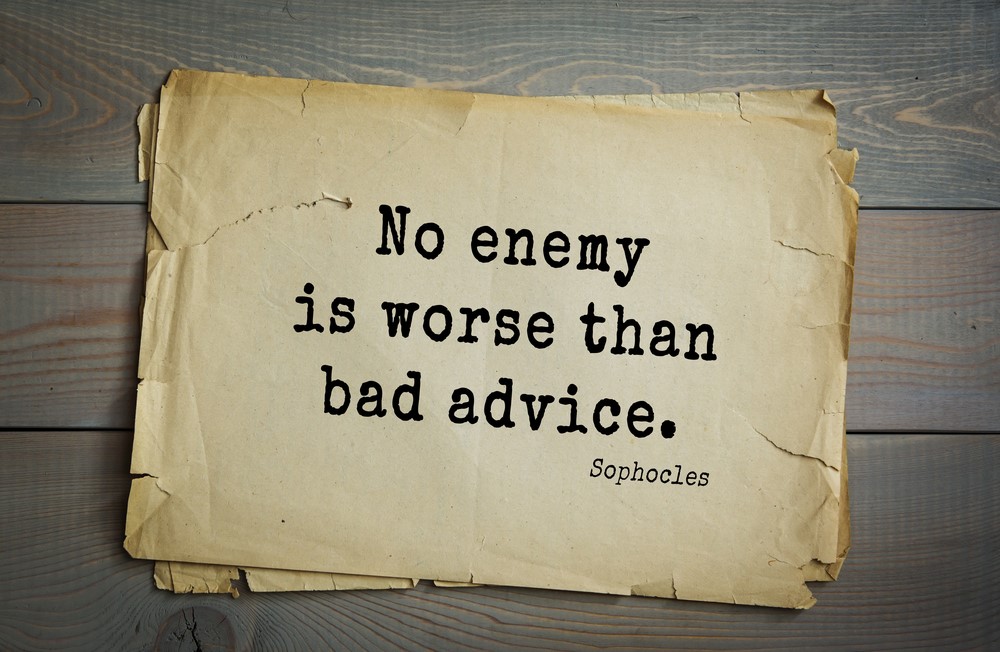
People love giving advice, they really do. And often, this doesn’t come in the form of a friendly suggestion, but as a surprisingly demanding should. Caregivers often bear the brunt of this so-called pattern, often getting pretty poor caregiving advice in the process.
Perhaps you’ve been told that you should visit your aging mother more often, that you should be kinder, more supportive, more compassionate. That you should be giving more, even if you’re already running yourself to the ground.
There are other types of advice too, like that you should take care of yourself better or that you should hire help.
Caregiving advice does have its place. The right piece of advice at the right time could even help you solve a serious problem.
However, it’s essential to be very cautious with caregiving advice. To do so, it helps to understand the motivations behind the advice that people give, along with why this advice is often completely unrealistic.
Why People Often Give Poor Caregiving Advice

They’re Probably Not Caregivers
Caregiving is one of those things that must be lived through to be understood. People on the outside don’t have much sense of what’s involved.
They’re often entirely unaware of all the decisions you need to make, the stress, the sense of overwhelm, and the way that little challenges add up day after day.
Even when they’re familiar with what you need to do regularly, friends and family often don’t understand the emotional toll.
They Don’t Always See The Big Picture
When people give poor caregiving advice (or any type of poor advice, really), they often focus on a single situation.
For example, you might be told that you should give up your career to focus on caregiving, when your work is part of what keeps you sane. Or, you might be spend more time with your aging mother, even if doing so risks destroying your marriage.
Let’s be realistic. Life is all about balance.
You can’t support an aging parent with everything you have. Doing so isn’t sustainable. You’d quickly crash and burn.
The only way to provide support year after year is to keep things in balance – to focus on your own needs throughout and not get too overwhelmed by the shoulds.
This may even mean doing things for yourself, like going out for dinner or to the movies, rather than doing what your aging parents want. There’s no need to feel guilty. You’re a person too and your wants and needs are completely valid.
There are other areas to think about too, like navigating the balance between caring and enabling.
Besides, being a caregiver isn’t a short-term gig. Some people end up caring for aging parents for years or even decades. You might even bounce straight from caring to one person to caring for someone else.
The only way you’ll ever do well is to keep looking at the bigger picture.
They Don’t Know the Situation Like You Do
Whether they’re a caregiver or not, the person giving you advice doesn’t know the ins and outs of your situation. They can’t.
They’re only ever seeing things from the outside.
Here’s an example. Ellen was often short on time and energy, juggling her children, her aging mother, work, and her own interests. She still found time to pick up odds and ends for her mother whenever asked, often going out of her way to do so.
Friends and family often said that she should take her mother out for the experience. Her mother needed to leave the house more and would love to go shopping with her daughter.
The suggestion made Ellen almost grind her teeth. Her mother did need to leave the house more – and could. She had plenty of ways to do so and friends who would gladly drive her at a moment’s notice. Ellen did not have the time or energy to deal with her mother’s constant interruptions and feet dragging when they shopped together.
Nor was it her responsibility to do so.
That story is just one example or poor caregiving advice.
You’re the only person who really understands your situation – so you need to trust your experience above any advice that others give.
They Have Their Own Emotional Reactions and Biases
As humans, we often think we’re being more rational than we actually are.
We have plenty of biases and assumptions that influence the way we see the world and how we think things should work.
This applies to anyone giving you advice as well. They may mean well, but their advice is getting filtered through a huge set of assumptions.
For example, they may be running off the idea that children should always support their parents – despite the fact that there are plenty of good reasons for choosing not to.
You won’t always be able to spot biases, so it’s important to simply remember that they’re there. Remember that there’s always more going on.
They’re Feeling Uncomfortable
This might sound strange, but sometimes the people who give you poor caregiving advice aren’t actually trying to help. We’re not talking about actively malicious people here – or those who are trying to sabotage you.
The pattern can actually apply to your friends and loved ones, people who genuinely want the best for you.
Part of the challenge is that humans often find the discomfort of others difficult. It’s emotionally hard to listen to someone who is struggling, so many people automatically offer solutions. They try to fix the problem, even if it doesn’t really have a solution.
Some people have learned how to listen and be supportive, without trying to fix things, but plenty of others haven’t.
This pattern often isn’t conscious.
Instead, people often assume that providing advice and suggestions is helpful. In many cases, they simply don’t know what else to do.
They don’t know how to help someone in a situation that doesn’t have a solution.
What Can You Do?

The first thing to do about caregiving advice is simple – trust yourself.
It’s still worth listening to what other people have to say. They may offer a new perspective or have an idea that you didn’t think about.
You then need to balance what they say against your own experience. Remember:
- They haven’t walked in your shoes
- They don’t know the complexity of your situation
- They have their own biases
- They might not know what to do
So, don’t take their shoulds on board too heavily. Remember that you have a better understanding of the situation than they ever will.
Acknowledge Their Attempts
It’s helpful to remember that most people are trying to be supportive – even if they sometimes come across as rude.
Often, it’s helpful to thank people for this. To tell them that you appreciate their efforts.
Doing so makes it easier to go against their advice without it feeling personal to them.
Be Honest, to a Point
Sometimes, honesty is useful as well. This could involve sharing a little bit about why their advice doesn’t work in practice. For example, if someone suggests that you should hire help, you might explain a little about the costs of doing so.
However, honesty should be tempered with wisdom.
There’s little benefit in sharing intensely personal details or the entire medical history of your loved one.
Also, sometimes the person you’re talking to mightn’t ‘get it’ regardless of how well you explain yourself. If this is the case, it might be better to simply say that you appreciate their advice, but will do things a different way.
Doing so basically means you’re drawing a boundary. After all, people in your life don’t need to understand or approve of your decisions. How much you share is your choice.
Suggest Other Ways to Help
Friends and family often have no idea how to support you.
Telling them can help.
Sometimes this may involve asking for practical help. Being specific is useful here. So, rather than saying you need more support, think about what you actually need. Perhaps a friend can visit your aging parent once a month or do a little gardening.
Other times you might just want emotional support.
You may simply need someone to listen for a while, to hear what you’re struggling with and perhaps comfort you. Sometimes a friendly ear and a hug is more powerful than all the advice in the world.
Feeling Overwhelmed?
Check out our Caregiving Consulting service for personalized support and guidance.


Leave a Reply